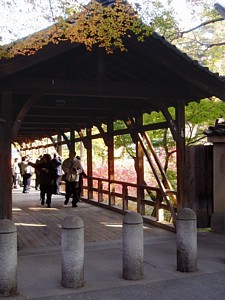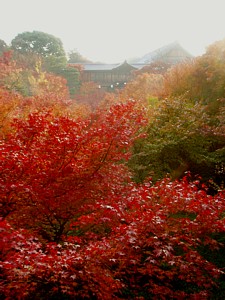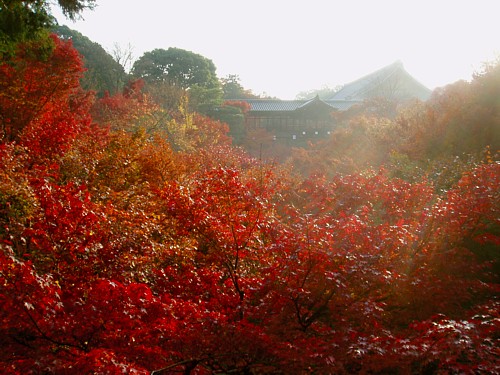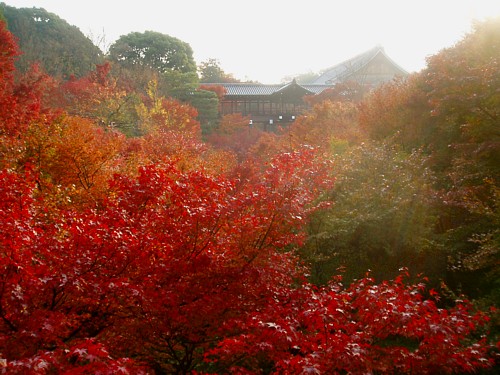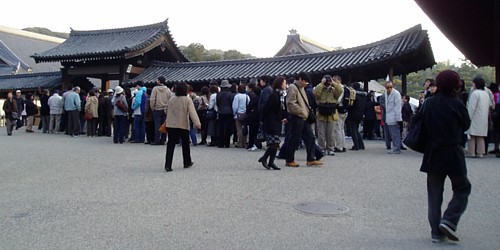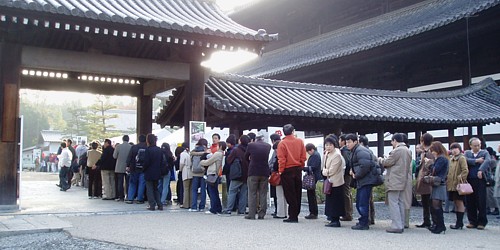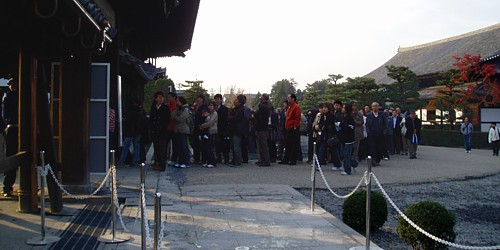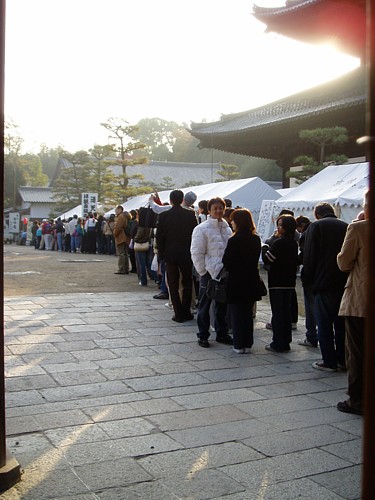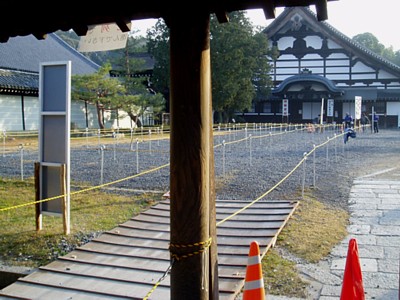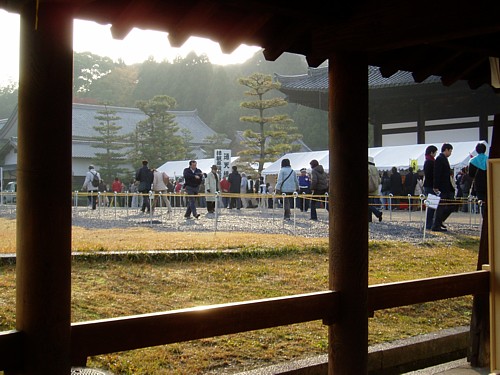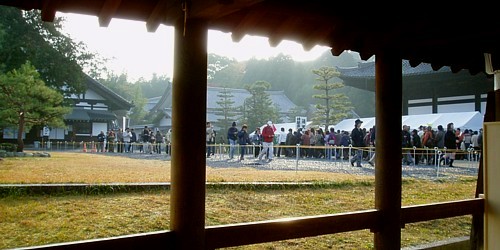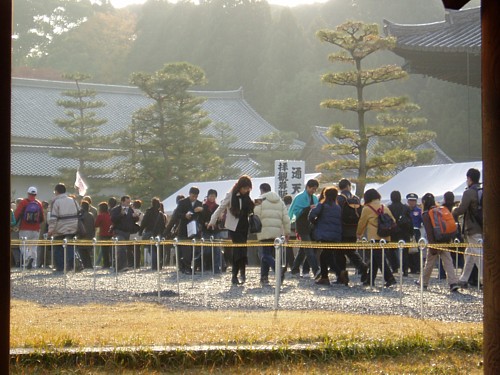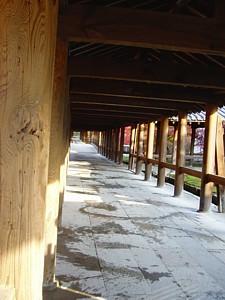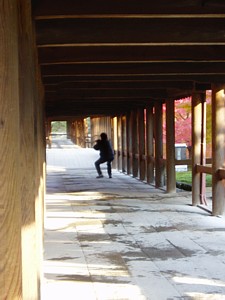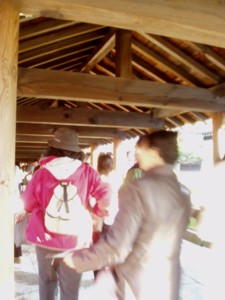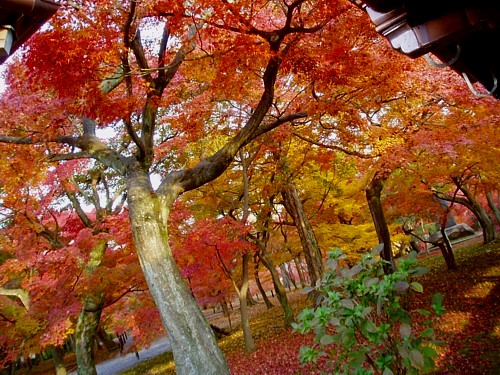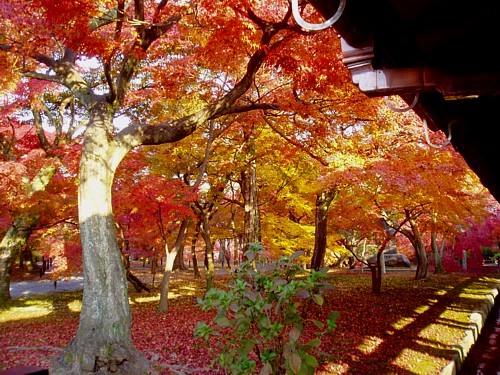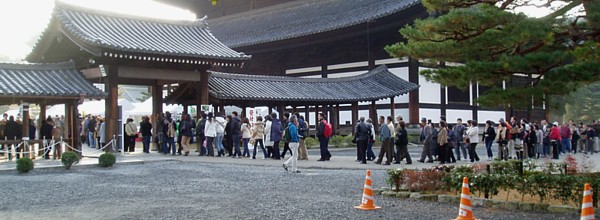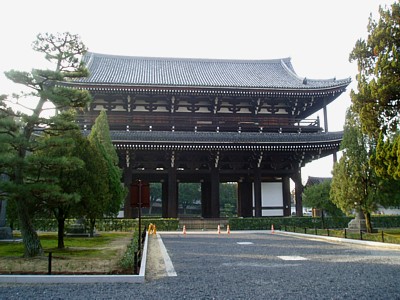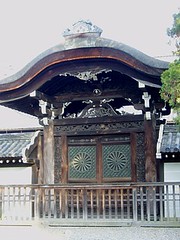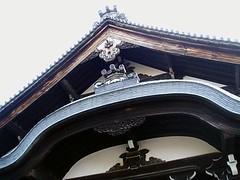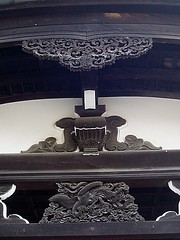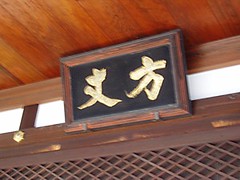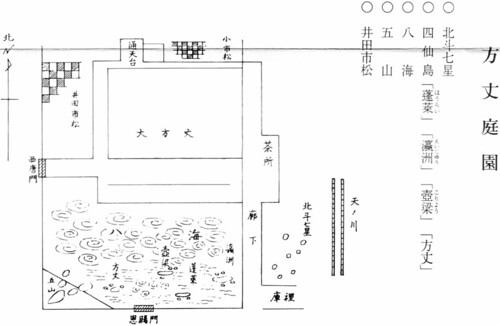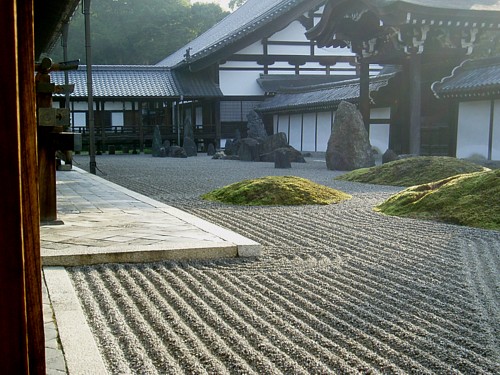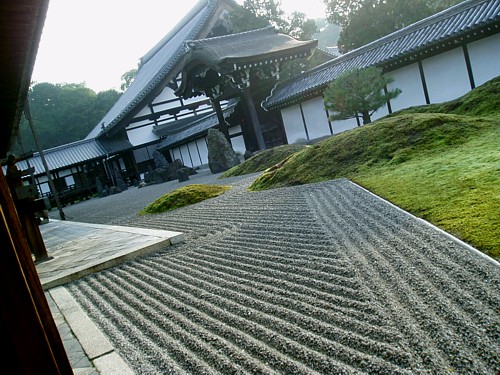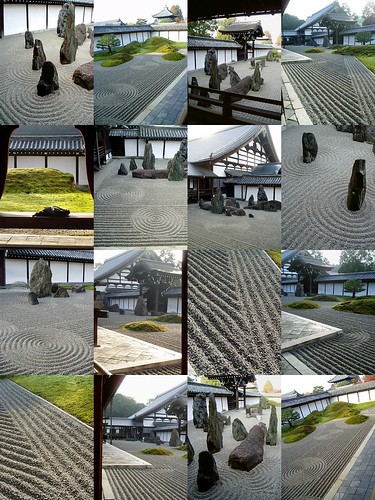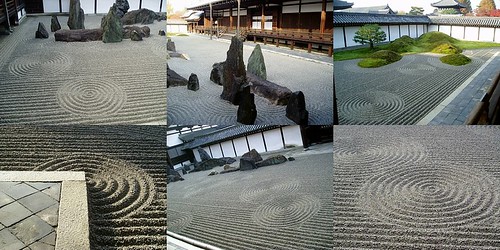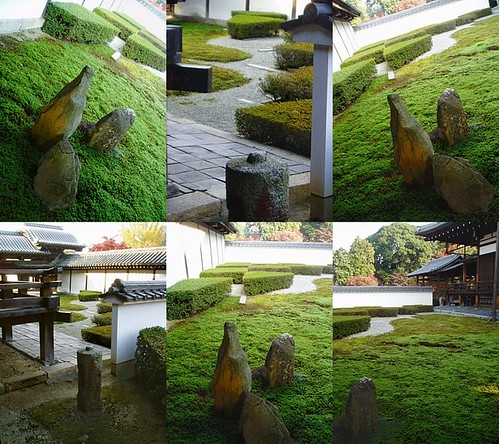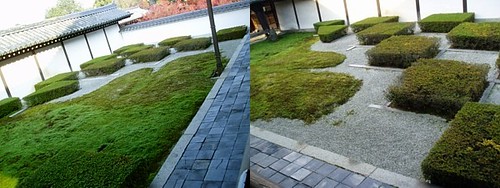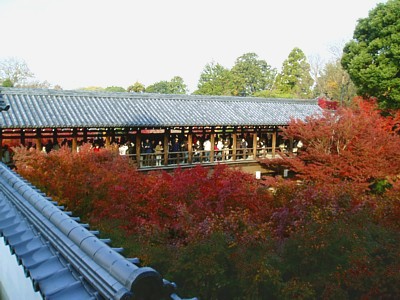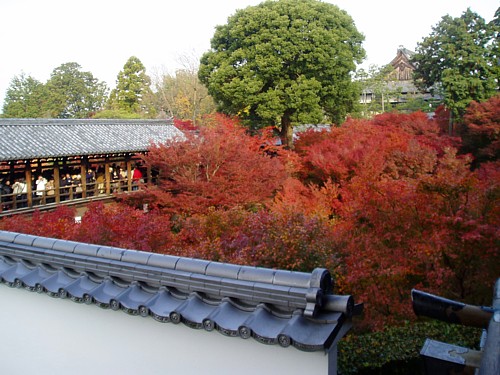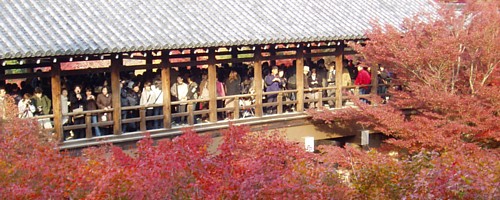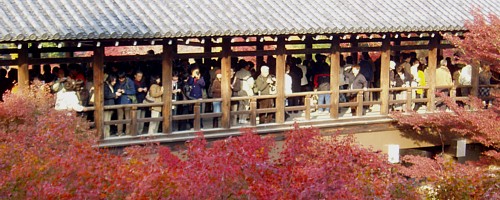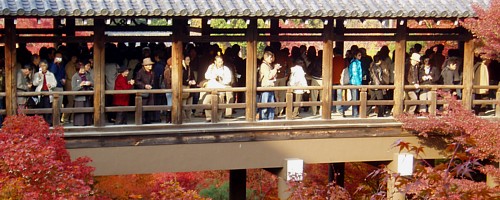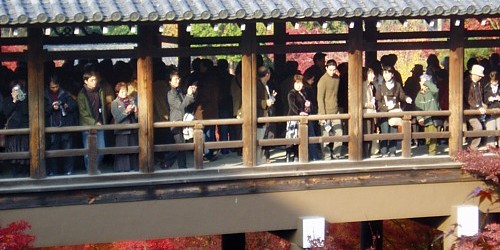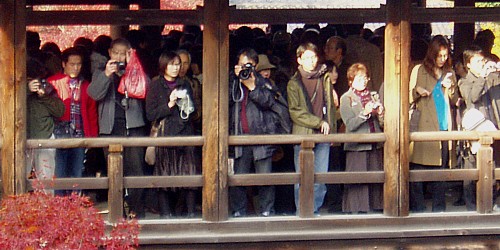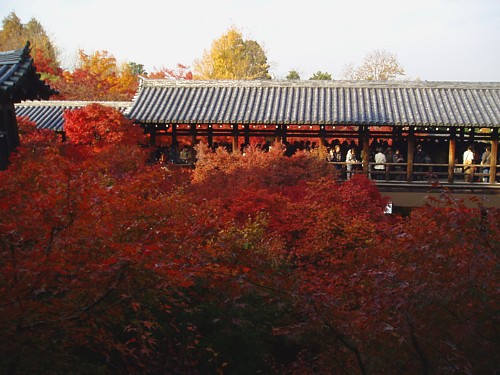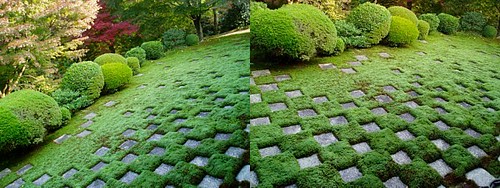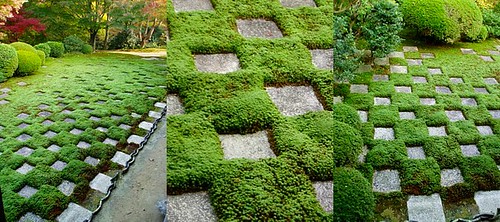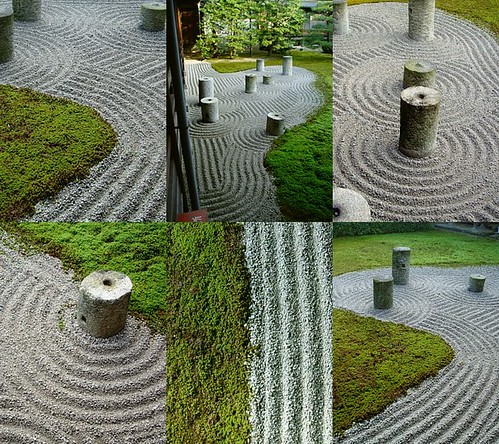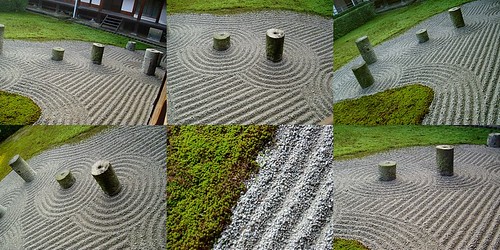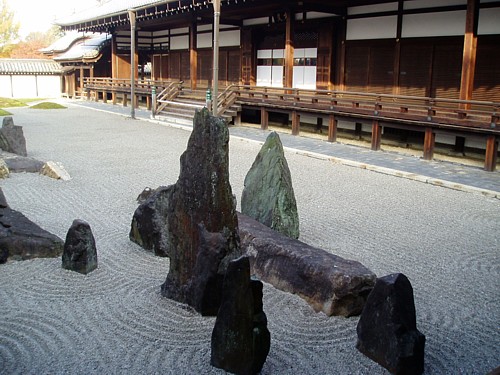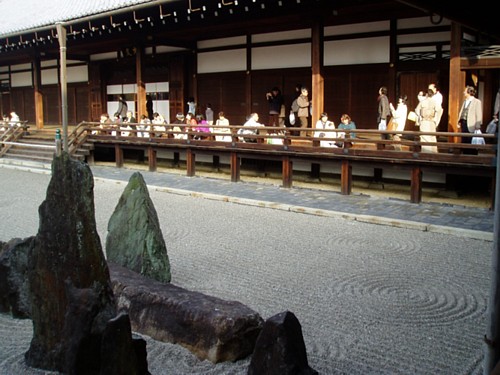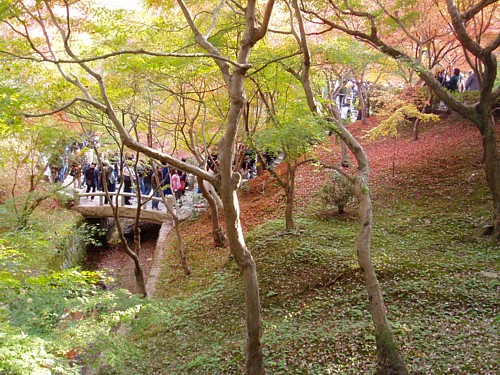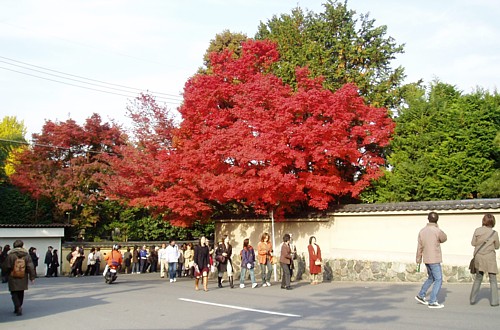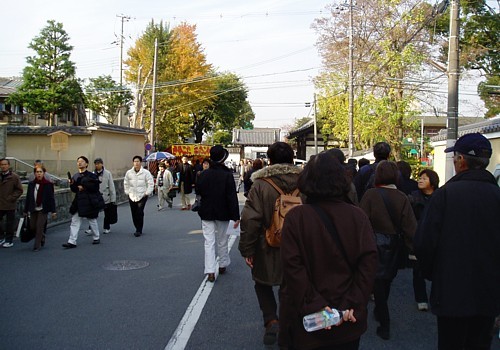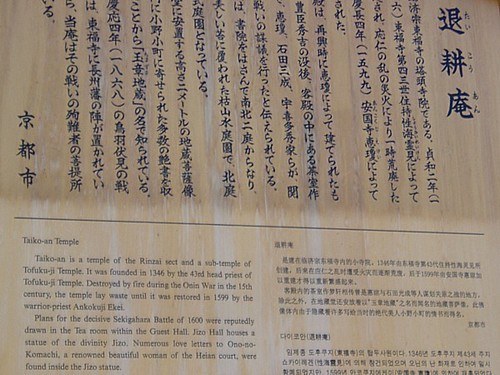
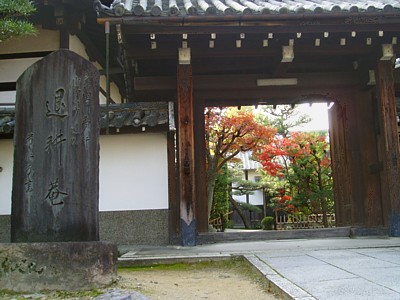
is this e principal Buddha image?
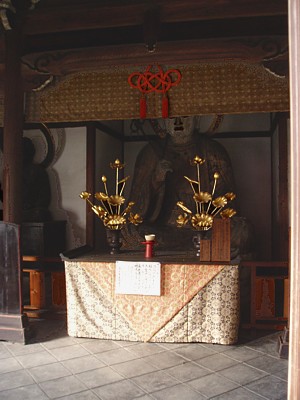
e cat didn't wander very far in as e place was deserted & appeared to be closed. according to this & this it seems that you can pay to enter into e buildings & a garden?
e beautiful ceiling above e Buddha image:
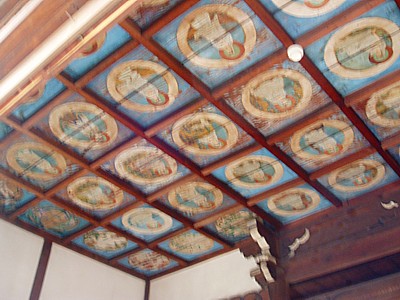
very blur as e cat didn't dare to use flash (not good for e lifespan of e paintings) + a wooden fence blocking e entrance to this hall didn't help at all when trying to focus (& there is absolutely no way e cat's back can bend into a full xia1 yao1/yoga wheel pose over e fence to face e ceiling!). wonder how many visitors look up & notice e ceiling?
e sharpened bamboo stakes (to keep 梁上君子 burglars out?) look quite vicious:
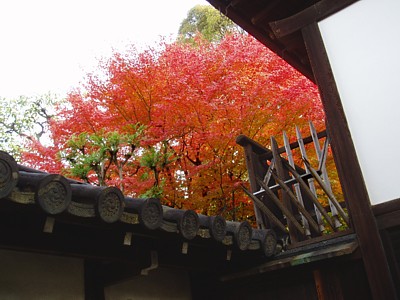
Taiko-an has a little well guarded by a little maple tree:
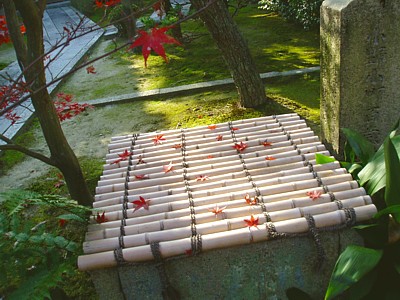
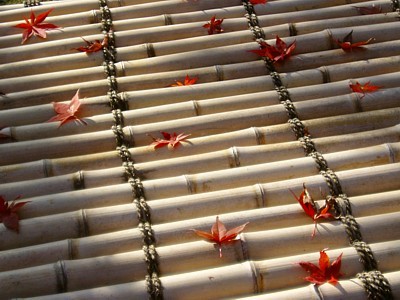
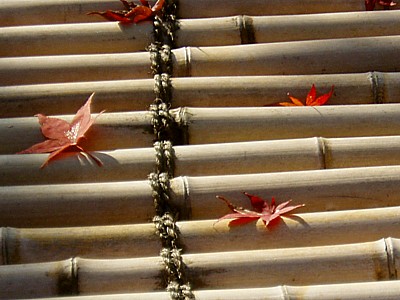
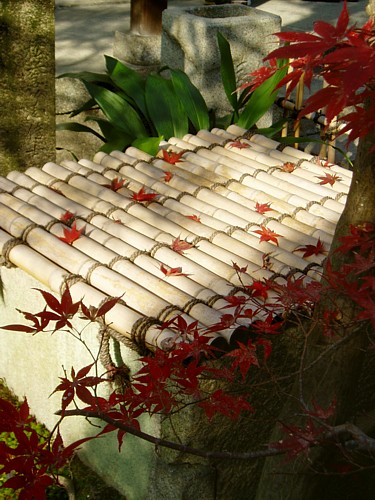
慧日幼稚園 kindergarten along e way out from Tofukuji to e main road:
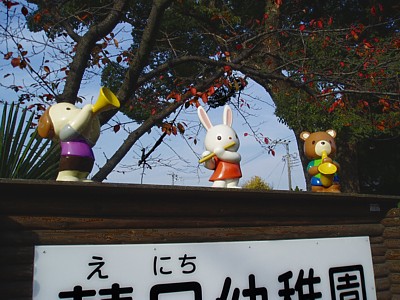
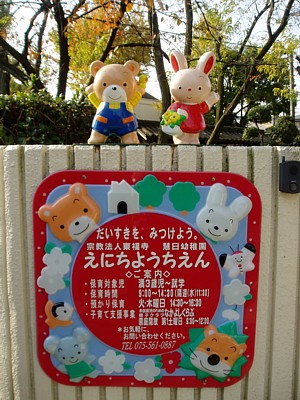
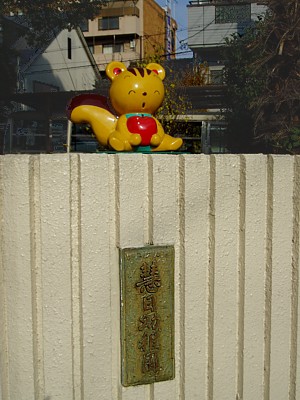
e appreciation of all things kawaii is drilled into Japanese from a young age =P
laundromat near Tofukuji that gives new meaning to e term 'money laundering':
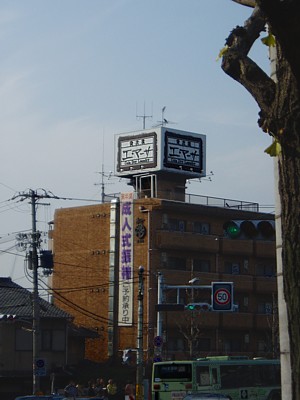
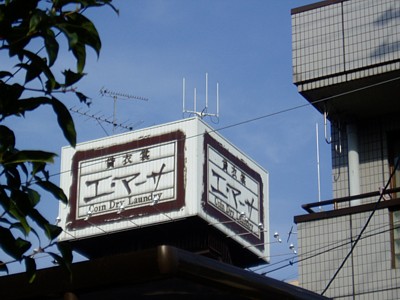
e main road was crowded with big fat tour coaches & security people were stationed there to control both human & vehicular traffic so that ambulances & other vehicles could still access e Red Cross hospital sitting right next to e turning to Tofukuji.
back to 三十三間堂 Sanjusangendo aka. 蓮華王院 Rengeo-in temple, where e cat was stuck at much earlier this morning because it was still closed:
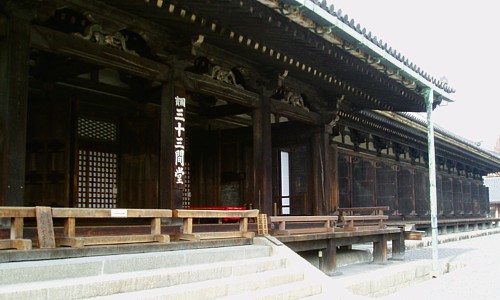
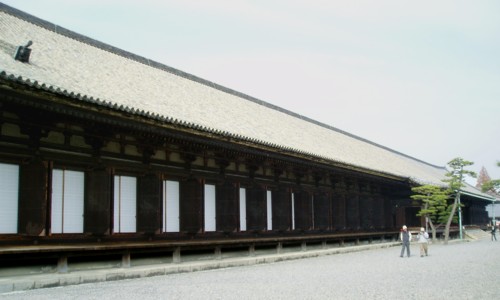
e 739 year-old (counting from its reconstruction in 1266) hall (do) has 33 (sanjusan) spaces (gen) between e columns, hence e name Sanjusangendo. it is ~120m long. what do you put in a hall so huge?
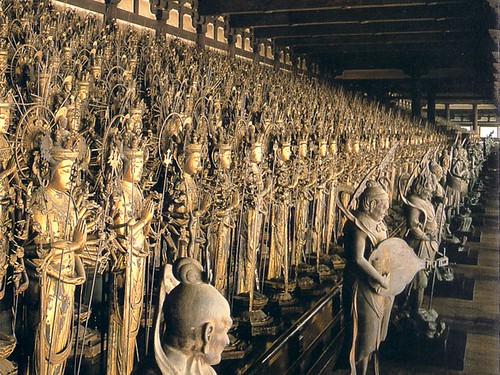
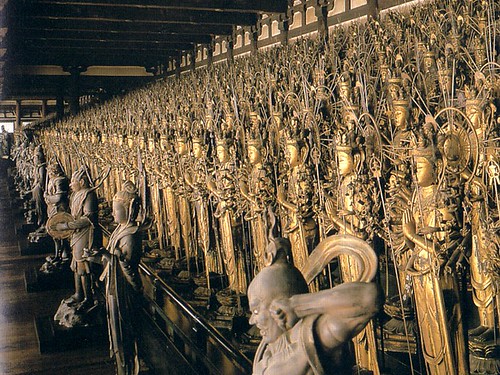
you fill it with 1000 statues (each taller than e cat) of Kannon (what e Chinese call 观音 Guanyin aka. Goddess of Mercy) + 28 statues of e guardian deities (nijuhachibushu) that protect Kannon (front-most row) + 1 statue each of Raijin ( 雷神 God of Thunder) & Fujin (風神 God of Wind)....& a huge seated statue of Kannon:
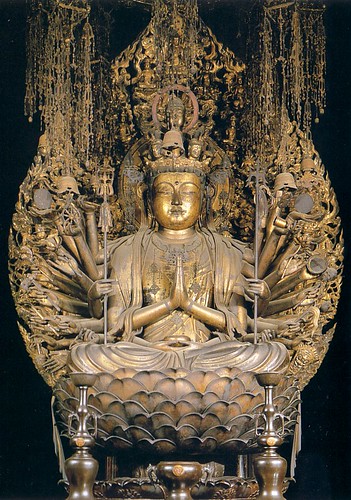
(scanned from e temple's brochure as photography isn't permitted within e hall)
behind all e statues is a corridor with interesting exhibits on e architecture of e temple hall, restoration of e 1000+ statues, & annual archery contest (complete with records of past winners since e 17th century), with a lot of information in English. this temple also has free lockers, & has been done up for barrier-free access, with gentle inclined ramps & wide enough space for wheelchairs to move within areas like e section that sells souvenirs & o-mamori =)
e west verandah of e hall serves as e venue for toshiya, an annual archery contest for new adults (those who will turn 20 in that year) on e second Monday of January (成人の日 seijin no hi aka. Coming of Age day):
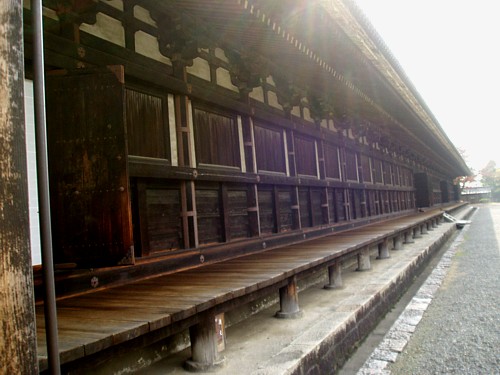
think it used to be a guys-only competition, where one of e events involved shooting arrows for 24 hours straight to see who could hit e target at e far end of e hall e most number of times. e record is held by a champion who landed more than 8000 of his 13000+ shots in 1686....13000+ divided by 24 hours divided by 60 minutes works out to more than 9 shots per minute or 1 arrow every 6-7 seconds. no idea if he ate or went to e loo at all or how he kept awake & focused or if he collapsed at e end of it all. now girls are allowed to take part, & many come to watch them compete in their kimonos + hakama.
east side of hall:
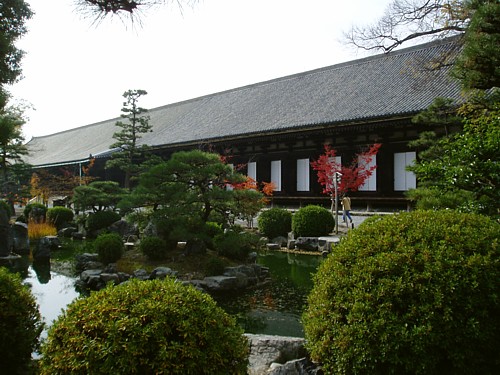
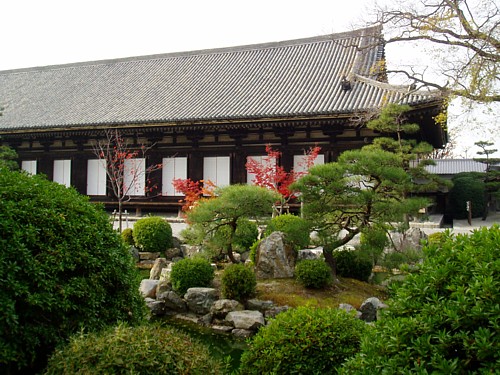
夜泣泉 - e spring that cries at night?
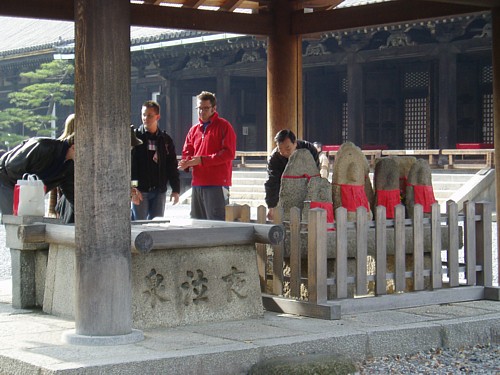
detail of roofing - [L-R] sunflower, peony & chrysanthemum:
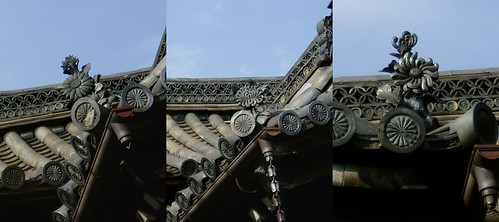
to get to e Kamigamo area in north Kyoto from Sanjusangendo, e cat had to change buses at Kyoto-ekimae terminal. & what a sight it was at Kyoto's main bus terminal right outside Kyoto train station on a peak season weekend:
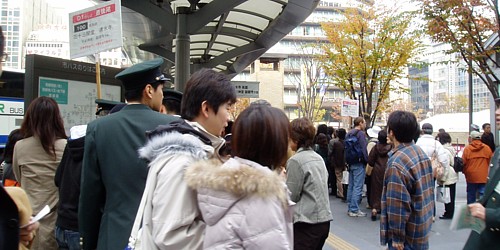
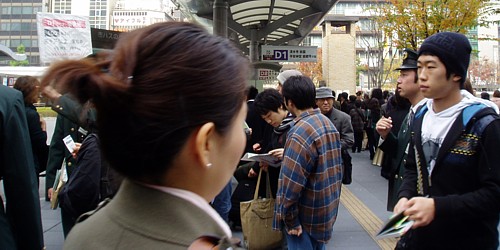
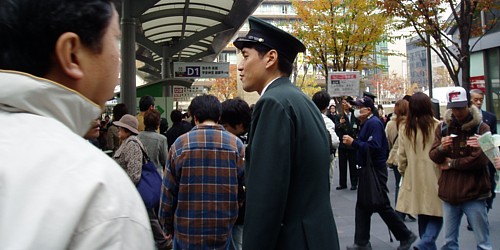
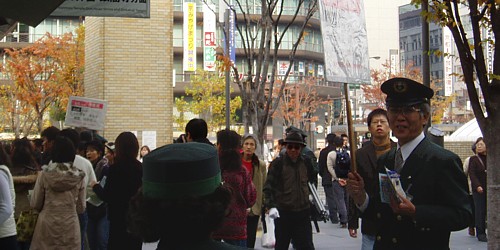
there was hardly any space to queue at e berths, with plenty of dazed lost sheep fresh off e trains & inter-city buses trying to figure out how to get to e hundreds of amazing sights in Kyoto. Kyoto City Bus company had their green-uniformed staff out in full force holding placards & stacks of free tourist maps to help with route & fare information =)
one amazing thing is how e berths do not have separate queues for e 3 or more different services that share it. when a bus arrives, people who are waiting for another service will simply step aside to let others board, & by Japanese magic e queue will fall neatly into place again, without anyone losing his place =)
today Kyoto City Bus had staff stationed at each berth to call out repeatedly e names of e most famous temples/attractions served by e various buses as they pulled up, & guide passengers onto e correct buses. e staff also helped to call out to e bus driver to wait (all buses have an intercom at e rear door where passengers board) if they noticed any stragglers running for e bus =)
Kyoto-ekimae bus terminal today was an orderly warzone, if there is ever such a thing =)
while waiting for e #4 service to 上賀茂石計町 Kamigamo-Ishikazucho, e homeless lady was spotted again:
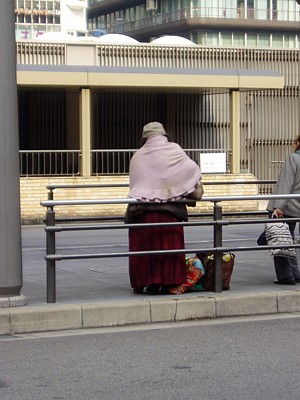
think she is wearing all of e warm clothing that she has. over e past 2 weeks or so e cat has come across this resident of Kyoto station several times. a reminder of how e rich-poor gap (more like a gaping chasm now) in Japan (& most countries around e world) keeps widening, & that a beautiful city like Kyoto has its harsh realities. here in Japan e homeless are usually careful not to cause obstruction or any nuisance (maybe except when they are drunk?), keeping a low profile & out of e way (like how e lady moved away to stand discreetly at an empty berth), & their belongings packed neatly:
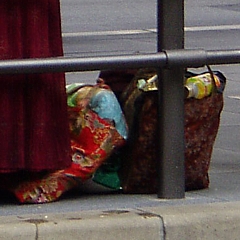
think e police are quite strict with them too. later today e cat would come across more of them, like how it met e homeless living around Shinobazu pond in Tokyo's Ueno Park 3+ years ago.

